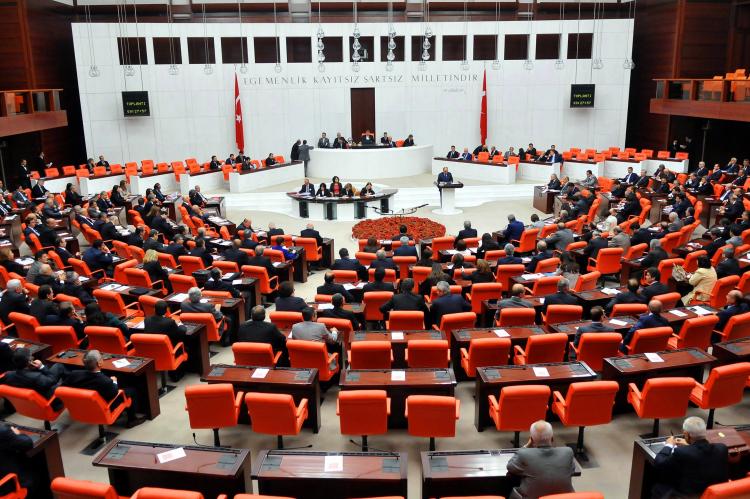Does the new motion legitimize rape?
New motion passed in Turkish parliament is claimed to legitimize rape
A new motion regarding an amendment on criminal procedure was passed in the parliament on 16 November 2016. The motion, which sparked a lot of speculation, reads as follows:
In the crimes of sexual abuse committed before 16 November 2016 and in the absence of force, threat, trickery, restriction of free will, the verdict based on penal law will be suspended in the case of marriage of the victim and the perpetrator.
The motion has been interpreted as a legitimization of rape, and therefore has been harshly criticized.12 It is claimed that the new motion allows rapists to be freed from prison if they marry the victim. However, the true nature of the motion has been largely distorted. The motion was proposed to address a particular type of victimization.
The motion does not allow the rapist to avoid jail time by marrying the victim, and under no circumstances does it forgive those committing sexual abuse to children. The motion leaves sexual criminals out of its scope.
The Minister of Justice Bekir Bozdag explained the amendment in the motion underlining that it addresses a victimization3:
Marriage before the age of 18 takes place in our society although we do not approve it. Official registration of the marriage cannot take place as the law does not permit it for those under the age of 18. When this couple has a baby outside official marriage, the doctor is legally compelled to report it to the public prosecutor. As a result, the father of the baby goes to prison leaving the mother and the baby alone. Some people face 16 years of prison due to the current law. The families and the couple have given consent, but the law puts the man in prison. There are approximately 3,000 citizens who face such penalty. The amendment in the motion is just a temporary regulation. It will not apply in future cases after 16 November 2016.4
An example of the case Bekir Bozdag mentioned was published in the Turkish daily Milliyet in 2014.5 According to the article, Fadime Kahraman fled home and got married at the age of 16. She had two children. Seven years later, her husband was given an 11 year sentence. Kahraman said:
I fled home in 2008 to get married, we had our official marriage in 2010 with the consent of our parents. My husband has been in prison for five months, I have two children, please help me. There are a lot of people like me, and I believe there must be a legal regulation for such situations.
Turkish Prime Minister Binali Yildirim was recently reported to have ordered the ruling Justice and Development Party deputies to meet with opposition parties to further discuss the issue and revize the motion if necessary.6 The Minister of Justice Bekir Bozdag and the Minister of Family and Social Policies Fatma Betul Sayan Kaya had a meeting with women's associations on 20 November 2016.7 The prime minister is going to have a meeting with women MPs and Justice and Development Party executives on 21 November 2016.
After the Justice and Development Party came to power in 2002, important steps have been taken in in the betterment of clauses regarding women’s rights in the Turkish Criminal Law (TCK). On 1 June 2005, the law that was passed in the parliament legally distinguished child abuse from abuse towards adults and defined child abuse as crime in its own right.
The law propounded that neither marrying the victim nor giving consent is exclusable in cases of child abuse, and the penalty was determined to be 16 years at minimum. This change in the criminal law was welcomed by women. It was noted that women’s sexual and physical rights were secured and sexual discrimination was eliminated as a result of the new law.8Yet, the relevant clause of the TCK (103/2) that determined the minimum penalty of 16 years in cases of child abuse was anulledby the Constitutional Court on 12 November 2015.9
Before the aforementioned changes made by the Justice and Development Party in 2005, the sexual abuse of children was not an independent crime and the penalty would be postponed in case of marriage of the victim and the perpetrator in cases of sexual abuse. Likewise, he penalty would be cancelled in cases of kidnapping with the purpose of marriage, and honour killings would be treated as petty crime.
- 1. http://www.cumhuriyet.com.tr/haber/siyaset/632216/Skandal_onerge_Meclis_...
- 2. http://www.diken.com.tr/magdur-istismarciyla-evlensin-diyen-akp-onergesi...
- 3. https://twitter.com/bybekirbozdag/status/799491891356172288
- 4. http://www.sabah.com.tr/gundem/2016/11/18/carpitilan-duzenlemeye-son-nok...
- 5. http://www.milliyet.com.tr/kucuk-yasta-kacarak-evlendigi-kocasi-kirsehir...
- 6. http://www.sabah.com.tr/gundem/2016/11/18/basbakandan-erken-yasta-evlili...
- 7. http://aa.com.tr/tr/politika/bozdag-kadin-dernekleri-temsilcilerini-dinl...
- 8. http://bianet.org/bianet/kadin/61713-kadinlar-tckda-kazandi-simdi-izleye...
- 9. http://www.milliyet.com.tr/aym-16-yil-i-iptal-etti-davalar-gundem-2170889/



